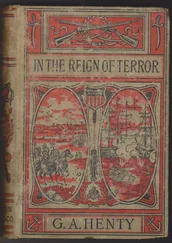Robert Silverberg - The Reign of Terror
Здесь есть возможность читать онлайн «Robert Silverberg - The Reign of Terror» весь текст электронной книги совершенно бесплатно (целиком полную версию без сокращений). В некоторых случаях можно слушать аудио, скачать через торрент в формате fb2 и присутствует краткое содержание. Год выпуска: 2003, ISBN: 2003, Издательство: HarperCollins, Жанр: Альтернативная история, на английском языке. Описание произведения, (предисловие) а так же отзывы посетителей доступны на портале библиотеки ЛибКат.
- Название:The Reign of Terror
- Автор:
- Издательство:HarperCollins
- Жанр:
- Год:2003
- ISBN:978-0-380-97859-5
- Рейтинг книги:5 / 5. Голосов: 1
-
Избранное:Добавить в избранное
- Отзывы:
-
Ваша оценка:
- 100
- 1
- 2
- 3
- 4
- 5
The Reign of Terror: краткое содержание, описание и аннотация
Предлагаем к чтению аннотацию, описание, краткое содержание или предисловие (зависит от того, что написал сам автор книги «The Reign of Terror»). Если вы не нашли необходимую информацию о книге — напишите в комментариях, мы постараемся отыскать её.
The Reign of Terror — читать онлайн бесплатно полную книгу (весь текст) целиком
Ниже представлен текст книги, разбитый по страницам. Система сохранения места последней прочитанной страницы, позволяет с удобством читать онлайн бесплатно книгу «The Reign of Terror», без необходимости каждый раз заново искать на чём Вы остановились. Поставьте закладку, и сможете в любой момент перейти на страницу, на которой закончили чтение.
Интервал:
Закладка:
Robert Silverberg
The Reign of Terror
The Emperor,” said Quintus Cestius, “dined last night on fish and mushrooms sprinkled with powdered pearls, on lentils with onyx, on turnips with amber. He has the stomach of an ox and the mind of a madman.”
“Ah, do you think he’s mad, then?” Sulpicius Silanus asked. A mischievous twinkle came into his eyes. “I don’t. I think he’s merely playful.”
“Playful,” Cestius said somberly. “Yes. Feeds his dogs on goose liver. Sleeps on couches of solid silver, with mattresses stuffed with rabbit fur or partridge feathers. Covers his furniture with cloth of gold. Yes, very playful indeed.”
“Has buckets of saffron dumped into the palace swimming pool before he’ll dip a toe in,” Silanus said.
“Cooking-pots of silver.”
“Wine flavored with poppy juice.”
“All his food tinted blue one night, green the next, scarlet the night after that.”
“Drove a chariot pulled by four elephants down the concourse in front of the Vatican Palace.”
“And one drawn by four camels, the week before. It’ll be dogs next week, I suppose, and lions the week after that.”
“A madman,” said Cestius.
“Merely very playful,” Silanus said. And they both laughed, though each of them knew only too well that the Emperor Demetrius II’s mounting extravagance was not any laughing matter; for Cestius was the Prefect of the Fiscus Imperialis, the Emperor’s private purse, and Silanus, his counterpart on the other side of the Roman treasury, was Prefect of the Fiscus Publicus, out of which all governmental expenditures came. In some reigns, those two great pots of money had been kept rigidly segregated. In others, the Emperors had been not unwilling to dip into their private funds to pay for such popular things as the rebuilding of aqueducts and bridges, the underwriting of gladiatorial games, and the construction of grand new public buildings. But the Emperor Demetrius had never seemed to see any distinction at all between Fiscus Imperialis and Fiscus Publicus. He spent as he pleased, and left it up to Silanus and Cestius to find the money in one department of the treasury or the other. And in the last few years the problem had been growing steadily worse.
It was the first day of the new month, when the two treasurers customarily lunched together in the dining room that was provided for high governmental officials in the Senatorial office building just in back of the Senate House. They made a curious couple: the perpetually gloomy Quintus Cestius was round as a barrel, a big, fleshy-cheeked man of florid complexion, and the ever-exuberant Sulpicius Silanus was small and lean and spare, a taut little hatchet of a man who could easily have been tucked in a stray fold of Cestius’s vast toga. The lunches that they favored were always the same, a plate of raw vegetables and apples for Cestius, and a gluttonous procession of soups, porridges, stewed meats, and aromatic cheeses soaked in honey for little Silanus. Cestius, plump from childhood though he had never had much of a fondness for food, often wondered where Silanus managed to store all that he was capable of consuming at a single sitting.
As he worked on a great haunch of boar Silanus said, without looking up, “I have had a letter from my brother in Hispania. He tells me the Count Valerian Apollinaris has finished the reconquest there and will be returning to the capital soon.”
“Wonderful,” said Cestius darkly. “A great triumphal feast will be in order, then. A million and a half sesterces scattered at a single throw to pay for it: flamingo brains, mullets baked on a bed of hyacinths shipped up from Sicilia, venison of the giant stag of the far northlands, wines a hundred years old, and all the rest. All of it wasted on Apollinaris, who will disapprove of the expense, and who will sit there stiff as one of those stone gods from Aegyptus, merely nibbling at this dish and that one. But I’ll have to find the money for it all the same. Or you will, I suppose.”
“My brother says,” Silanus continued, as though Cestius had not spoken at all, “that the thrifty Count Valerian Apollinaris is deeply disturbed by the shortfall in military funds that made his work of reconquest so much more complicated than it needed to be, and intends to speak vigorously with His Majesty concerning a tighter domestic budget.”
“The Count would be well advised not to try.”
“Would anyone, even the Emperor, dare to lay a finger on the Count Valerian Apollinaris, the hero of the War of Reunification?”
“I don’t mean that he’d be in any danger,” said Cestius. “Only that the Emperor will pay no attention. Just the other day the equally thrifty Larcius Torquatus took the very same matter up with the Emperor at the palace. I wasn’t there, but I heard. If anything, Torquatus has become more ferocious on the subject of the Emperor’s wastefulness than Apollinaris ever was, now that he’s part of the government himself. So there they were, the Consul and the Emperor, the Consul ranting and shouting, the Emperor laughing and laughing.”
“And he would laugh at us as well. You and I are the only two officials in the entire government who care at all about his level of expenditures. Other than Apollinaris and Torquatus, of course.”
“Yes. All the rest are fools or weaklings, or else just as mad as the Emperor himself.”
“And you and I are the ones who have to find the funds to pay the bills, somehow. We are the ones who bear the burden of the Emperor’s lunacy,” said Silanus.
“Indeed.”
“And has the Emperor dismissed Torquatus, then, for shouting at him?”
“Oh, no, not at all. As ever, the Emperor is untroubled about such things. After Torquatus left the palace, I’m told, Demetrius sent him a little gift as a peace offering: the beautiful harlot Eumenia, stark naked and covered all over with gold dust, sitting in a jeweled carriage drawn by the black horses of Arabia that cost a hundred thousand sesterces apiece. They say that Torquatus nearly had a stroke when he saw it arrive.”
“Well, then,” said Silanus, “you’d better start putting money aside for a present for Apollinaris.”
The Count Valerian Apollinaris, just then, was hundreds of miles away in the great Hispanian city of Tarraco, the final stopping point on his whirlwind military tour of the Empire’s rebellious western provinces. One by one he had subjugated them with a minimal expenditure of force and bloodshed: first Sicilia, where all the trouble had begun back in 2563, then Belgica and Gallia, and finally Hispania. His technique had been the same in each place, arriving with a small hand-picked army of tough, grim legionaries, demanding of the local governors an immediate renewal of the oath of allegiance to the Emperor, and then the swift seizure and public execution of eight or ten insurrectionist leaders as an example to the others. The idea was to remind the provincials that Roma was still Roma, that the Imperial army was as efficient and ruthless now as it had been in the days of Trajan and Hadrian and Marcus Aurelius seventeen centuries before, and that he, Count Valerian Apollinaris, was the living embodiment of all the ancient Roman virtues that had made the Empire the immortal globe-spanning entity that it was.
And it had worked. In a series of quick, bloody strokes, Apollinaris had put an end—for all time, he hoped—to the slow, steady process of crumbling that had afflicted the Empire for nearly a century, during this era of foolishness and wanton waste that was beginning to be known as the Second Decadence.
Now, coming to the end of his fourth term of office as Consul, he was ready to return to Roma and enter into private life once more. Power for its own sake had never interested him, nor great wealth, or enormous luxury. Wealth was something he had been born to, and he took it for granted; power had accrued to him almost by default from his early manhood on, and because he had never hungered for it he never abused it; and as for enormous luxury, he left that to those who craved it, such as that hapless idiot, the Emperor Demetrius II.
Читать дальшеИнтервал:
Закладка:
Похожие книги на «The Reign of Terror»
Представляем Вашему вниманию похожие книги на «The Reign of Terror» списком для выбора. Мы отобрали схожую по названию и смыслу литературу в надежде предоставить читателям больше вариантов отыскать новые, интересные, ещё непрочитанные произведения.
Обсуждение, отзывы о книге «The Reign of Terror» и просто собственные мнения читателей. Оставьте ваши комментарии, напишите, что Вы думаете о произведении, его смысле или главных героях. Укажите что конкретно понравилось, а что нет, и почему Вы так считаете.












